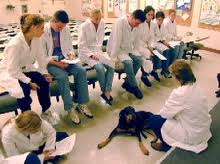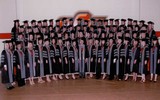University of Missouri - College of Veterinary Medicine

The MU College of Veterinary Medicine has several foci of strength. One is the unique clinical curriculum. The curriculum in the last two years requires six continuous weeks in each of seven clinical specialties. Teaching is done in a form of apprenticeship with as much pragmatic involvement as possible in the Teaching Hospital. The design of teaching within blocks is highly flexible and permits frequent adaptation and improvement. Graduates are offered an average of nearly three jobs each.
Teaching & Research : Curriculum

The DVM degree is achieved after a four-year course of study. At the University of Missouri-Columbia, the first two years are largely spent in classroom and laboratories with the second two years devoted to clinical study in the MU Veterinary Medical Teaching Hospital.
The first two years of the professional curriculum are designed to provide the student with a solid foundation in basic medical science. Courses of study include gross and microscopic anatomy, molecular biology, physiology, microbiology, pathology, pharmacology, parasitology, toxicology, public health, clinical pathology, radiology, clinical medicine and surgery, and anesthesiology.
These courses are taught in the laboratory and lecture format familiar to science students. In some areas, a computer-based or autotutorial teaching approach is used. Other areas use problem-based teaching methods.
After successfully completing the second year of the professional program, the student enters a segmented curriculum for the years of clinical training. In this concept of veterinary medical training, the final two years are divided into 12 six-to-eight-week rotations. Students must successfully complete seven required rotations for graduation. Each six-to-eight-week rotation is a complete instructional unit. Students are given the opportunity to concentrate their studies in an area of special interest while gaining exposure to all aspects of veterinary medicine. The required rotations are food animal medicine and surgery, equine medicine and surgery, small animal medicine, small animal surgery, medical services (radiology and anesthesiology), diagnostic pathology and special species medicine, and focused specialties (ophthalmology, theriogenology, and small animal specialty medicine).
In addition to the seven required rotations, 2 six-to-eight-week rotations are required in elective courses. Clinical year students are also scheduled 3 six-week periods of free time for preceptorships in private practice, industry, additional course work, or vacation.
BIOMED: Undergraduate Biomedical Sciences
In addition to the four-year professional curriculum leading to the Doctor of Veterinary Medicine (DVM) degree, the college offers a variety of undergraduate courses. Currently the college does not offer a major or minor in any of the departments. However, courses serve as electives for other degree programs, a component to the Bachelor of General Studies degree, and as partial requirements in the Pre-veterinary Medicine Scholars program.Certificate of Achievement in Biomedical Sciences
A dean's certificate of achievement is awarded to any student who takes at least 15 credit hours in BIOMED courses and achieves a BIOMED GPA of 3.0, or higher, with no less than a C- in any BIOMED course on the first attempt.Current Undergraduate Courses
Fall Semester

Biomedical Career Explorations BIOMED 1010: An introductory course for freshmen interested in a career in some aspect of the biomedical sciences. (1 hour credit)
Problems in Biomedical Research BIOMED 2085: Assignment of problems for training in research. (Credits arranged)
Animal Handling and Physical Restraint BIOMED 2120: Procedures for handling and restraining a variety of animals with emphasis on safety of the animal and its handler. (2 hours credit)
Animal Sanitation and Disease Prevention BIOMED 2230: Preventative measures for disease and parasites of farm animals. (3 hours credit)
Inactivity and Disease BIOMED 2420: Biology of inactivity as a casual factor in chronic disease. (2 hours credit)
Internship in Biomedical Sciences BIOMED 2940: Supervised work experience to develop technical skills and enhance knowledge in an area of biomedical sciences. (Credits arranged)
Problems in Biomedical Research BIOMED 3085: Assignment of problems for training in research. (Credits arranged)
Animal Welfare & Ethics BIOMED 3300: Contemporary issues in biomedical science relating to the use of animals in research and agriculture. (3 hours credit)
Pharmacology BIOMED 3326: General principles of pharmodynamics in domesticated animals. (3 hours credit) Bio Sci credit*
Life Sciences Research: Models and Methods BIOMED 4010: A review of basic laboratory animal and non-animal research models and procedures commonly used in academia and the drug/chemical industry. (3 hours credit) Bio Sci credit*
Veterinary Cell Biology BIOMED 4333 (Same as VBMS 5506 Veterinary Molecular and Cellular Biology): Course material stresses cell biology as related to animal health and medical issues. Consent of instructor required. (4 hours credit) Bio Sci credit*
Spring Semester

Problems in Biomedical Research BIOMED 2085: Assignment of problems for training in research. (Credits arranged)
Biomedical Terminology BIOMED 2110: Terms commonly used in the life sciences. (3 hours credit) Communications Credit*
Veterinary Medical Terminology BIOMED 2111: Medical terms unique to veterinary medicine. Must be taken after or concurrent with BIOMED 2110. (1 hour credit) Communications Credit*
Companion Animals BIOMED 2140: Focus on companion dog, cat, and horse owner concerns such as health issues, zoonoses, legal responsibilities, inbreeding, choice-of-breeds, behavioral problems, and loss of companion animals. (3 hours credit)
Microbiology for Health Sciences BIOMED 2210: A basic microbiology course for Nursing, Health Related Professions and other interested students. (5 hours credit) Bio Sci Credit*
Internship in Biomedical Sciences BIOMED 2940: Supervised work experience to develop technical skills and enhance knowledge in an area of biomedical sciences. (Credits arranged)
Problems in Biomedical Research BIOMED 3085: Assignment of problems for training in research. (Credits arranged)
Equine Health Topics BIOMED 3310: Contemporary issues relating to horse health.Requires AN SCI 3254 or equivalent (contact instructor for consent) (3 hours credit)
Time Determined By Instructor

Parasitology BIOMED 3250: Parasites of medical and veterinary importance are discussed as are the principles of parasitism. (3 hours credit)
Techniques in Pathology BIOMED 3335: Methods and techniques in fixing, preparing, and staining pathological specimens (cr. arr.).
Clinical Epidemiology and Environmental Health BIOMED 3347: Ecologic basis of health and cause-effect relationships. Evaluation of control programs. Includes epidemiology of important acute and chronic disease (cr. arr.).
*These courses meet a portion of the Biological Sciences or Communications requirements for entering the College of Veterinary Medicine.
The MU College of Veterinary Medicine is affiliated with the Mid-Missouri Associated Colleges And Universities (MMACU), a consortium Of MU, Williams Woods University, Stephens College, Westminster College, and Lincoln University. Full-time undergraduate students at the five member colleges may take courses for credit on any of the five campuses. The intent of cross-registration is to support students' educational needs when a desired course is unavailable at the home institution or when there are inherent schedule conflicts. Forms and additional information are available from the MMACU office, 11 Jesse Hall, 573-882-6598.
 Contact Us: W-231 Veterinary Medicine Building
College of Veterinary Medicine
University of Missouri
Columbia, MO 65211
Contact Us: W-231 Veterinary Medicine Building
College of Veterinary Medicine
University of Missouri
Columbia, MO 65211Phone: 573-882-9594
Mail: chastainc@missouri.edu
Site: http://cvm.missouri.edu/
